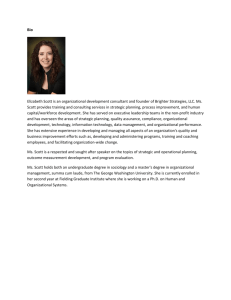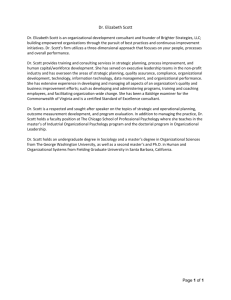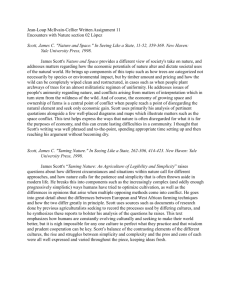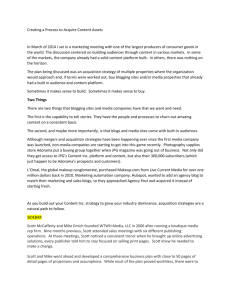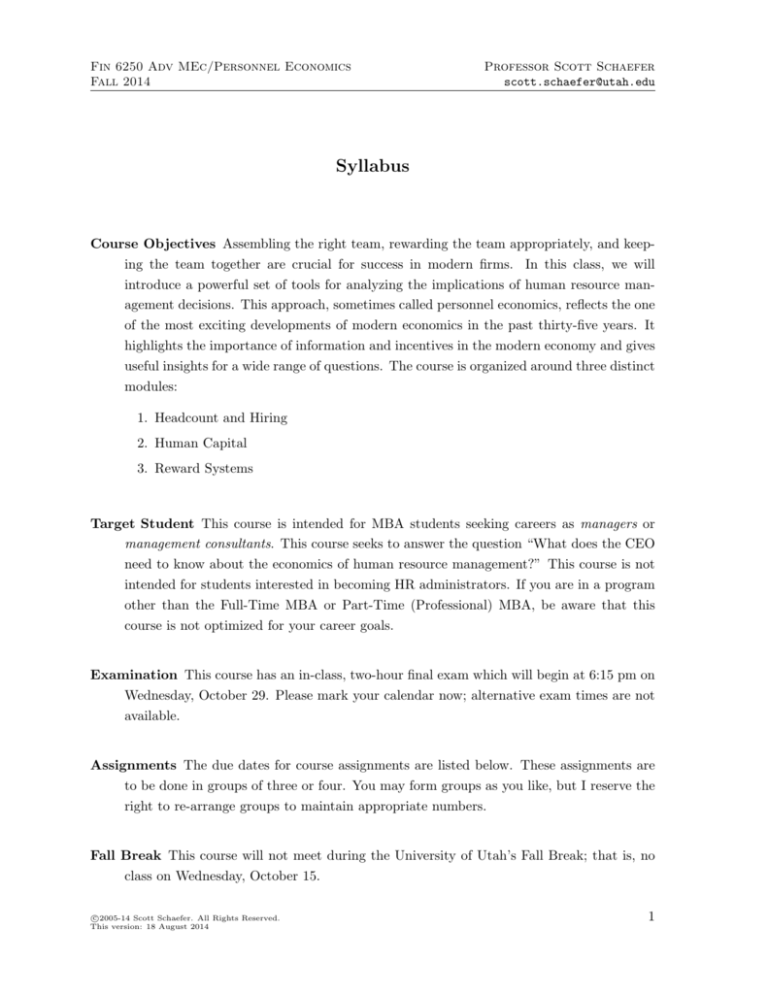
Fin 6250 Adv MEc/Personnel Economics
Fall 2014
Professor Scott Schaefer
scott.schaefer@utah.edu
Syllabus
Course Objectives Assembling the right team, rewarding the team appropriately, and keeping the team together are crucial for success in modern firms. In this class, we will
introduce a powerful set of tools for analyzing the implications of human resource management decisions. This approach, sometimes called personnel economics, reflects the one
of the most exciting developments of modern economics in the past thirty-five years. It
highlights the importance of information and incentives in the modern economy and gives
useful insights for a wide range of questions. The course is organized around three distinct
modules:
1. Headcount and Hiring
2. Human Capital
3. Reward Systems
Target Student This course is intended for MBA students seeking careers as managers or
management consultants. This course seeks to answer the question “What does the CEO
need to know about the economics of human resource management?” This course is not
intended for students interested in becoming HR administrators. If you are in a program
other than the Full-Time MBA or Part-Time (Professional) MBA, be aware that this
course is not optimized for your career goals.
Examination This course has an in-class, two-hour final exam which will begin at 6:15 pm on
Wednesday, October 29. Please mark your calendar now; alternative exam times are not
available.
Assignments The due dates for course assignments are listed below. These assignments are
to be done in groups of three or four. You may form groups as you like, but I reserve the
right to re-arrange groups to maintain appropriate numbers.
Fall Break This course will not meet during the University of Utah’s Fall Break; that is, no
class on Wednesday, October 15.
c
2005-14
Scott Schaefer. All Rights Reserved.
This version: 18 August 2014
1
Fin 6250 Adv MEc/Personnel Economics
Fall 2014
Professor Scott Schaefer
scott.schaefer@utah.edu
Expectations I have four main expectations of students:
1. I expect that you come prepared. MBA graduates are expected to contribute
meaningfully in setting the direction of a business. I will cold-call you in class to
give you practice with speaking up.
2. I expect that you remain engaged. When your fellow students are speaking, I
expect you to be paying attention to them. When I am speaking, I expect you to be
paying attention to me. Specifically, this means I do not want you on your phone,
your tablet, or your laptop during class.
3. I expect that you treat others with respect. Being respectful does not mean
that we cannot disagree. It does mean that we do so without name-calling or mocking.
4. I expect that you uphold the University of Utah’s Code of Student Rights
and Responsibilties. Please review this code, which is published here:
http://regulations.utah.edu/academics/6-400.php.
I use the formal sanctions under this code — particularly for academic misconduct
— far more often than I would like. Please be honest in doing your work.
Office Hours I expect that this course will be challenging. I am here to help you learn, and
I welcome your questions either by e-mail or during office hours. My office hours are
• Tuesday 10:00 am to 1:45 pm
• Friday noon to 2:30 pm.
I am available during office hours on a first-come, first-served basis. I am available by
appointment at other times, although I normally reserve Thursdays to work off-campus
to prepare for the following week’s classes.
Class Session Structure I will attempt to structure each class meeting to consist of three
sessions each with an approximate length of one hour and ten minutes, with a ten-minute
break between. At times, however, the material may lend itself to alternative timing.
This class meets from 6:00 pm until 10:00 pm, and you should not expect class to end
before 10:00 pm.
c
2005-14
Scott Schaefer. All Rights Reserved.
This version: 18 August 2014
2
Fin 6250 Adv MEc/Personnel Economics
Fall 2014
Professor Scott Schaefer
scott.schaefer@utah.edu
Required Reading Students enrolled in this class are required to purchase three sources of
reading materials.
1. A case packet directly from Harvard Business School Publishing. To access this case
packet, visit the link below
https://cb.hbsp.harvard.edu/cbmp/access/27761979
If this is your first time accessing materials from HBSP, you will need to “Register”
as a student user before you can purchase the case pack.
2. Edward P. Lazear and Michael Gibbs, Personnel Economics in Practice, 2nd ed.,
Wiley, 2009.
3. Paul Oyer, Everything I Ever Needed to Know about Economics I Learned from
Online Dating, Harvard Business School Press, 2014.
Grading Your grade will be based on your performance relative to the rest of the class. I
expect the GPA earned by the class overall will be between 3.1 and 3.5; the median
student in this class will likely earn a B+ or an A-. Your grade will depend on
1. Final exam (50%)
2. Group assignments (25%)
3. Class participation (25%)
Class Participation Class participation is essential in order for you to get the maximum
benefit from the course. I will rely on the quality of contributions, rather than quantity,
to evaluate your participation. A good comment advances the class’s understanding of
the issue and builds on previous points.
Accommodation Statement The University of Utah seeks to provide equal access to its
programs, services and activities for people with disabilities. If you will need accommodations in the class, reasonable prior notice needs to be given to the Center for Disability
Services, 162 Olpin Union Building, 801-581-5020. CDS will work with you and the instructor to make arrangements for accommodations.
All written information in this course can be made available in alternative format with
prior notification to the Center for Disability Services.
c
2005-14
Scott Schaefer. All Rights Reserved.
This version: 18 August 2014
3
Fin 6250 Adv MEc/Personnel Economics
Fall 2014
Professor Scott Schaefer
scott.schaefer@utah.edu
Important Dates
• Wednesday, September 3 Group Assignment #1 Due at the Start of Class
• Wednesday, September 10 Group Assignment #2 Due at the Start of Class
• Wednesday, September 17 Group Assignment #3 Due at the Start of Class
• Wednesday, September 24 Group Assignment #4 Due at the Start of Class
• Wednesday, October 1 Group Assignment #5 Due at the Start of Class
• Wednesday, October 8 Group Assignment #6 Due at the Start of Class
• Wednesday, October 22 Group Assignment #7 Due at the Start of Class
• Wednesday, October 29 Final Examination
c
2005-14
Scott Schaefer. All Rights Reserved.
This version: 18 August 2014
4
Fin 6250 Adv MEc/Personnel Economics
Fall 2014
Professor Scott Schaefer
scott.schaefer@utah.edu
Topics and Readings
Course Session 1
Wednesday, August 27
Topic
Introduction: Personnel Economics and Profits
Headcount and Hiring: Measuring Productivity
Required Reading
Personnel Economics, Chapter 1.
Case Study
Juhudi Kilimo: Designing Microfinance Staff Incentive Plans
Required Reading
Ram Charan, “It’s Time to Split HR,” Harvard Business Review, July-August 2014.
“New Recipe for Cost Savings: Replace Highly Paid Workers,” The Wall Street Journal,
June 11, 2003.
Preparation Questions
Come to class prepared to discuss the following questions. I will cold-call.
1. Why use an incentive plan rather than simply asking people to do their best?
2. How does the choice of incentive plan factor into Juhudi Kilimo’s goal of training
additional loan officers?
3. Why might the firm’s current employees have different preferences about the firm’s
incentive plan options?
c
2005-14
Scott Schaefer. All Rights Reserved.
This version: 18 August 2014
5
Fin 6250 Adv MEc/Personnel Economics
Fall 2014
Professor Scott Schaefer
scott.schaefer@utah.edu
Course Session 2
Wednesday, September 3
Topic
Hiring: Search and Matching
SG Cowen Case Discussion
Required Reading
Personnel Economics, Chapter 2.
Everything I Ever Needed to Know about Economics I Learned from Online Dating, Chapter 1, “Search Theory: Deciding When to Settle.”
Case Study
SG Cowen: New Recruits
Preparation Questions
Come to class prepared to discuss the following questions. I will cold-call.
1. A Cowen employee suggests that the firm should consider recruiting MBA students
from the University of Utah. How should the firm decide whether this would be
profitable?
2. Should the firm recruit MBAs at all? Why not just hire undergraduates?
3. Which candidate would you rank highest, and why?
c
2005-14
Scott Schaefer. All Rights Reserved.
This version: 18 August 2014
6
Fin 6250 Adv MEc/Personnel Economics
Fall 2014
Professor Scott Schaefer
scott.schaefer@utah.edu
Course Session 3
Wednesday, September 10
Topic
Hiring: Asymmetric Information
oDesk Case Discussion
Required Reading
Everything I Ever Needed to Know about Economics I Learned from Online Dating, Chapter 4, “Signaling: Putting Your Money Where Your Mouth Is.”
Case Study
oDesk: Changing How the World Works
Preparation Questions
Come to class prepared to discuss the following questions. I will cold-call.
1. oDesk is a labor-market intermediary; that is, it stands between buyers and sellers.
How does it improve on the outcomes that buyers and sellers could achieve without
oDesk?
2. How is oDesk different from its competitors?
3. How should oDesk expand, and why?
c
2005-14
Scott Schaefer. All Rights Reserved.
This version: 18 August 2014
7
Fin 6250 Adv MEc/Personnel Economics
Fall 2014
Professor Scott Schaefer
scott.schaefer@utah.edu
Course Session 4
Wednesday, September 17
Topic
Human Capital: Investing in Employees
Motorola University Case Discussion
Case Study
Motorola U.: When Training Becomes an Education
Required Reading
Personnel Economics, Chapter 3.
Preparation Questions
Come to class prepared to discuss the following questions. I will cold-call.
1. Why is Motorola unhappy with the skillset of its current employees?
2. Think of Motorola U as a make-or-buy decision. Why is Motorola choosing to “make”
better educated employees rather than simply “buying” them?
3. Should Motorola continue this program once the skills of its current employees have
been upgraded?
c
2005-14
Scott Schaefer. All Rights Reserved.
This version: 18 August 2014
8
Fin 6250 Adv MEc/Personnel Economics
Fall 2014
Professor Scott Schaefer
scott.schaefer@utah.edu
Course Session 5
Wednesday, September 24
Topic
Human Capital: Turnover and Retention
ARISE Case Discussion
Case Study
ARISE: A Destination-for-a-Day Spa
Required Reading
Personnel Economics, Chapter 4.
Preparation Questions
Come to class prepared to discuss the following questions. I will cold-call.
1. Does ARISE’s differentiation strategy require a different approach to HR management? If so, why?
2. What are the sources of the firm’s turnover problems?
3. Assess the potential benefits and costs of the firm’s “All-Star Team” plan.
c
2005-14
Scott Schaefer. All Rights Reserved.
This version: 18 August 2014
9
Fin 6250 Adv MEc/Personnel Economics
Fall 2014
Professor Scott Schaefer
scott.schaefer@utah.edu
Course Session 6
Wednesday, October 1
Topic
Reward Systems: Tournaments and Efficiency Wages
Atento Case Discussion
Required Reading
Personnel Economics, Chapter 10.
Personnel Economics, Chapter 11.
Case Study
Atento: Managing the Employee Life Cycle in Brazil
Preparation Questions
Come to class prepared to discuss the following question. I will cold-call.
1. Select two of the first six initiatives listed on pages 7-8 to recommend, and be prepared to justify your recommendation. Think also about the problems Atento might
encounter when following your recommendations.
c
2005-14
Scott Schaefer. All Rights Reserved.
This version: 18 August 2014
10
Fin 6250 Adv MEc/Personnel Economics
Fall 2014
Professor Scott Schaefer
scott.schaefer@utah.edu
Course Session 7
Wednesday, October 8
Topic
Reward Systems: Subjective Performance Evaluation and Culture
Required Reading
Personnel Economics, Chapter 15.
James Stewart, “Taking the Dare,” The New Yorker, July 26, 1993. (See Canvas for
instructions on accessing this article.)
John Shook, “How to Change a Culture: Lessons from NUMMI,” MIT Sloan Management
Review, Winter 2010.
Preparation Questions
Come to class prepared to discuss the following questions. I will cold-call.
1. Why did the Credit Suisse choose not to pay bonuses, and was this decision “reasonable”?
2. What accounts for the differences in expectations between the firm and its bankers?
3. Why was GM afraid to allow workers to stop the line?
c
2005-14
Scott Schaefer. All Rights Reserved.
This version: 18 August 2014
11
Fin 6250 Adv MEc/Personnel Economics
Fall 2014
Professor Scott Schaefer
scott.schaefer@utah.edu
Course Session 8
Wednesday, October 22
Topic
Reward Systems: Employee Ownership and Non-Wage Benefits
Trunk Club Case Discussion
Required Reading
Personnel Economics, Chapter 12.
Personnel Economics, Chapter 13.
Case Study
Trunk Club
Preparation Questions
Come to class prepared to discuss the following questions. I will cold-call.
1. Is the firm’s limited equity pool better used to attract new talent or reward existing?
2. Would you recommend a vesting schedule for equity grants? Why or why not?
3. Why use equity at all rather than, you know, money?
c
2005-14
Scott Schaefer. All Rights Reserved.
This version: 18 August 2014
12
Fin 6250 Adv MEc/Personnel Economics
Fall 2014
Professor Scott Schaefer
scott.schaefer@utah.edu
Course Session 9
Wednesday, October 29
Topic
Final Examination
c
2005-14
Scott Schaefer. All Rights Reserved.
This version: 18 August 2014
13

